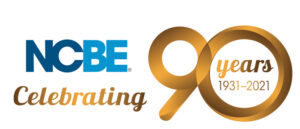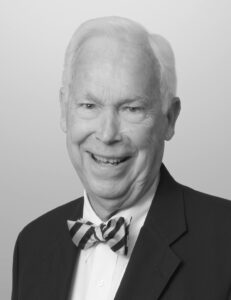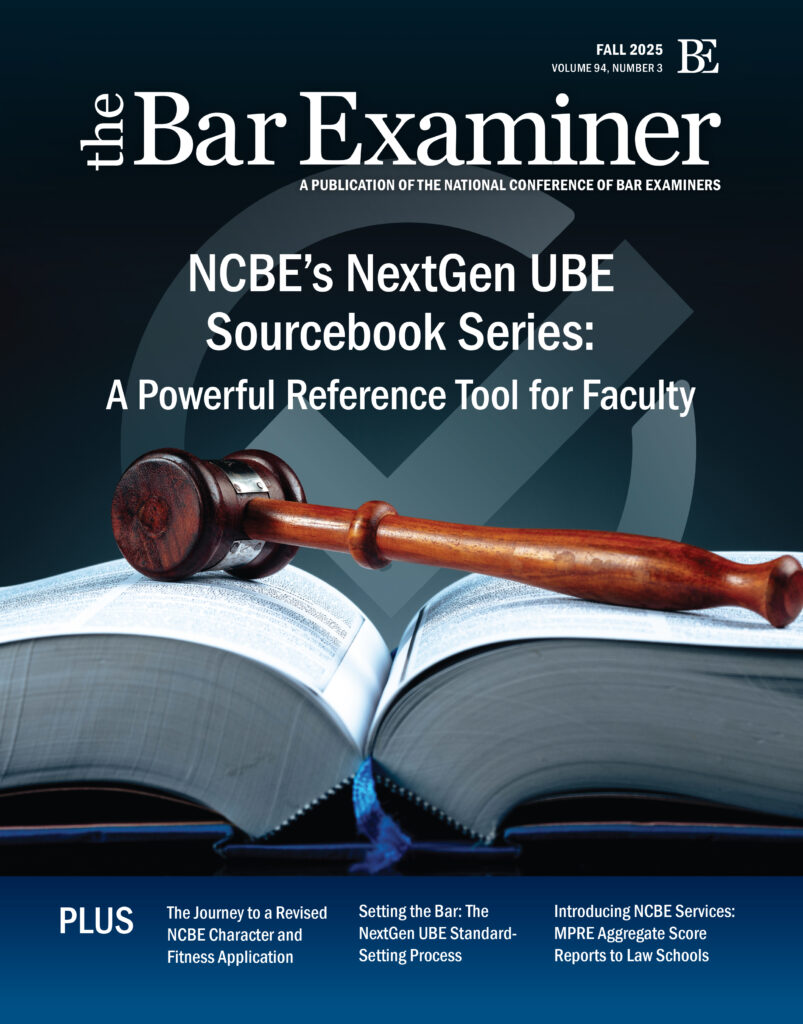This article originally appeared in The Bar Examiner print edition, Summer/Fall 2021 (Vol. 90, Nos. 2–3), pp. 20–23.


In this portion of our 90th anniversary section we remember two prominent people in NCBE history: Joe E. Covington, NCBE’s first director of testing from 1969 to 1985, and John F. Germany, NCBE Board of Trustees chair from 1974 to 1976—both of whom were trailblazers in their roles as key figures in launching the Multistate Bar Examination (MBE).
We also remember the first and second woman chairs of NCBE’s Board of Trustees and their accomplishments as pioneers in the legal profession: Marygold (“Margo”) Shire Melli, NCBE chair from 1989 to 1990, and Beverly Tarpley, NCBE chair from 1992 to 1993.
Excerpts below are from remembrances published in Bar Examiner articles over the years.
We begin with a brief remembrance of John F. Germany and Joe E. Covington written by Douglas D. Roche, NCBE Board chair 1987–1988, as he reflects on his associations with them while he served on NCBE’s MBE Committee.
When I joined the MBE Committee in 1974, I found myself among able, diligent, and friendly colleagues. The first chair during my term was John Germany of Florida, one of the fathers of the MBE. John, a very busy and successful lawyer, contributed immense amounts of time and talent to getting the MBE developed and accepted around the country. An unfailingly cordial gentleman, John found the time to mentor a rookie—me. John has remained my friend to this day. The relationships that John developed with bar examiners and Courts throughout the country were very helpful to his successors.
I also fondly recall Joe Covington, the Conference’s first Director of Testing. Joe, a former dean of the University of Missouri–Columbia School of Law, also played a significant role in launching the MBE as well as being its great advocate. His reputation and contacts in the law school community enabled him to recruit the very best for the test drafting committees. His talent scout abilities extended to identifying bar examiners who could contribute to the work of the MBE Committee and the Conference.
— Douglas D. Roche, “The Early Days of NCBE’s MBE Committee: Reminiscences from a Former Chair,” (81)4 The Bar Examiner 14–16 (December 2012).
Joe E. Covington, NCBE’s first director of testing, 1969–1985
(Remembered by John F. Germany, NCBE Board chair 1974–1976, as he reflects on when they reunited after having shared a class at Harvard in 1947)
 Our paths crossed again when I attended a meeting of the National Conference of Bar Examiners in 1969 as a member of the newly formed NCBE Bar Examination Committee. Joe, who was by this time teaching at the University of Missouri-Columbia, was a member of a panel convened to discuss “A Uniform Bar Exam: National and Regional.”
Our paths crossed again when I attended a meeting of the National Conference of Bar Examiners in 1969 as a member of the newly formed NCBE Bar Examination Committee. Joe, who was by this time teaching at the University of Missouri-Columbia, was a member of a panel convened to discuss “A Uniform Bar Exam: National and Regional.”
At that meeting, Joe made one of his first great contributions to the multistate bar exam by giving a name to our efforts to bring some uniformity and objectivity to the bar examination process. At the time, the states were fearful of a “national” bar exam which could cause them to lose their jurisdiction over the admitting process. Joe suggested we call our proposed examination a “multistate bar examination,” and the name stuck. The committee was so impressed with Joe that we asked him to become the reporter to our committee and he agreed. From then on, he met with us in developing the examination….
The energy created by this committee was a sight to behold. All of us knew that we were breaking new ground which would change the testing process…. With the mounting number of applicants … the grading of essay papers was becoming onerous, and the delay in announcing the results was becoming unacceptable to both the state courts and the examinees. The time was ripe for a new examining process where a multistate test could be prepared according to professional standards and graded in a matter of a few weeks, giving jurisdictions additional time to grade any essays.
— John Germany, “Joe Covington: A Remembrance,” (68)4 The Bar Examiner 7–10 (November 1999).
DID YOU KNOW?
NCBE’s Joe E. Covington Award for Research on Testing for Licensure, established in honor of Covington, began in 1999 as the Joe E. Covington Prize for Scholarship in Bar Admissions Topics (and was subsequently called the Joe E. Covington Award for Research on Bar Admissions Testing prior to its current title). The award is intended to provide support for graduate students in any discipline doing research germane to testing and measurement, particularly in a high-stakes licensure setting. For more information, visit ncbex.org/statistics-and-research/covington-award/.
John F. Germany, NCBE Board chair 1974–1976
(Remembered by Robert L. Potts, NCBE Board chair 1994–1995)
 Those of us in bar examining who were fortunate enough to have worked with [John] realize what an outstanding mentor he was and the significant positive impact he had on the entire bar examining process….
Those of us in bar examining who were fortunate enough to have worked with [John] realize what an outstanding mentor he was and the significant positive impact he had on the entire bar examining process….
He enrolled at Harvard Law School, where he first met Joe Covington, with whom he later conceived, developed, and marketed the Multistate Bar Examination….
In 1967 the Florida Supreme Court appointed John to the Florida Board of Bar Examiners, and he soon became convinced that the Florida Bar Exam, consisting solely of essay questions drafted by out-of-state law professors, was of poor quality and that the grading was subjective and not uniform. The number of applicants in Florida was becoming so large that the grading process threatened to overwhelm bar examiners and delay the announcement of results unacceptably. He discovered the same problem in other states with large applicant populations.
In 1969 John was appointed to NCBE’s newly formed Bar Examination Committee, where he reconnected with his law school friend Joe Covington. Joe was made reporter of the Committee, and they, with assistance of the other members and the Educational Testing Service, began work on a groundbreaking examination with 200 multiple-choice questions covering five subjects, designed to bring uniformity and objectivity to the bar examining process—what we have all come to know as the Multistate Bar Examination.
The first MBE was administered by 11 jurisdictions in February of 1972. Joe Covington was made NCBE Director of Testing, and he and John and other members of the Committee traveled the country “selling” the test to other jurisdictions. John became chair of the MBE Committee in 1976, and eventually almost all jurisdictions adopted the exam and continue to use it today.
During his tenure as chair of the NCBE Board of Trustees from 1974 to 1976, John was instrumental in organizing and supporting bar admission administrators in a new organization known as the Committee (now Council) of Bar Admission Administrators (CBAA). This action not only captured a huge reservoir of talent and knowledge that could be used to improve the bar exam process but provided a means of uniting and fostering communication among administrators nationwide.
— Robert L. Potts, “In Memoriam: John F. Germany,” (84)3 The Bar Examiner 48 (September 2015).
Marygold (“Margo”) Shire Melli, NCBE Board chair 1989–1990
(Remembered by Robert L. Potts, NCBE Board chair 1994–1995)
 Margo Melli [was the] esteemed Voss-Bascom Professor of Law Emerita at the University of Wisconsin Law School, first woman chair of the NCBE Board of Trustees, and [a] remarkable pioneer and role model for women in the legal profession. Those of us who worked with [Margo] during her many years of dedicated service to NCBE remember especially her leadership role in developing and promoting the Multistate Essay Examination—a concept Margo first proposed when she was serving on the Board in 1982 and which led to her generally being viewed as the “mother of the MEE.” Margo also served for nearly 20 years as a member of NCBE’s Editorial Advisory Committee, which evaluates content for the Bar Examiner.
Margo Melli [was the] esteemed Voss-Bascom Professor of Law Emerita at the University of Wisconsin Law School, first woman chair of the NCBE Board of Trustees, and [a] remarkable pioneer and role model for women in the legal profession. Those of us who worked with [Margo] during her many years of dedicated service to NCBE remember especially her leadership role in developing and promoting the Multistate Essay Examination—a concept Margo first proposed when she was serving on the Board in 1982 and which led to her generally being viewed as the “mother of the MEE.” Margo also served for nearly 20 years as a member of NCBE’s Editorial Advisory Committee, which evaluates content for the Bar Examiner.
Margo’s interest in, and commitment to, bar admissions began in the late 1970s when she became a member of the Supreme Court of Wisconsin agency now known as the Wisconsin Board of Bar Examiners. She was ahead of her time in encouraging the concept of uniform testing that eventually came to fruition years later as the Uniform Bar Examination: in the 1980s, she was the author of an essay in the Bar Examiner on the future of the bar examination in which she predicted the creation of the UBE….
…. By the time Margo was in the eighth grade, she had developed a strong interest in politics and decided she wanted to become a lawyer. [She matriculated] at the University of Wisconsin with a major in international relations after graduating from high school….
As one of the few female students in her law class, she was well accepted by her male classmates … and by the faculty, making the Law Review and graduating second in her class of 191 students. However, in spite of her excellent academic record, the dean of the law school (who controlled the hiring process at that time) would not recommend her for an interview with a law firm because, he said, “None of these firms would hire you. Why should I waste their time?” Likewise, she was discriminated against when applying for other law-related jobs in the Madison area but finally landed a fellowship with a new Legislative Council, an agency set up to study existing laws and proposed legislation and to recommend revisions to improve state laws in Wisconsin, which began by revising the Wisconsin Criminal Code.
She excelled in her position with the Legislative Council, was hired on a permanent basis, and was later employed by the Wisconsin Judicial Council. In those posts she made many important friends, including members of the UW Law School faculty who collaborated with her on various law reform projects. In 1959, she was the first woman in the history of the UW Law School to be offered a tenure-track teaching position….
Margo’s contributions, both as a scholar and as a role model for women, have been widely recognized. Among many other honors, she received the University of Wisconsin System Award for Outstanding Contributions to the Advancement of Women in Higher Education and the American Bar Association’s Margaret Brent Women Lawyers of Achievement Award, an award that recognizes and celebrates the accomplishments of women lawyers who have excelled in their field and have paved the way to success for other women lawyers. In 1994, the Legal Association for Women of the State Bar of Wisconsin established the annual Marygold Melli Achievement Award to recognize and celebrate individuals who have made outstanding contributions to the interests of women in law.
— Robert L. Potts, “In Memoriam: Marygold Shire Melli,” (87)1 The Bar Examiner 62–63 (Spring 2018).
Beverly Tarpley, NCBE Board chair 1992–1993
(Remembered by Jerome C. Hafter, NCBE Board chair 1998–1999)
 … Beverly Tarpley, appointed to the NCBE Board in 1985 and the second woman to serve as NCBE chair, from 1992 to 1993, was at the pivot point in breaking the glass ceiling in the American legal profession.
… Beverly Tarpley, appointed to the NCBE Board in 1985 and the second woman to serve as NCBE chair, from 1992 to 1993, was at the pivot point in breaking the glass ceiling in the American legal profession.
Beverly was a prodigy in the law. Born in 1930 in Houston, Texas, Beverly enrolled as an undergraduate at the University of Texas at the age of 15. She earned her bachelor’s degree at 19 and became one of four women to enter the University’s law school in 1949. Beverly was the only woman in her entering class at UT to finish, earning her J.D. in 1951. She was required, however, to wait until her 21st birthday to sit for the Texas Bar Exam.
Entering the legal profession remained a hurdle; in the early 1950s, Texas law firms were only beginning to open their doors to women attorneys. However, Beverly received an invitation to join the Abilene firm of Scarborough, Yates, Scarborough and Black in 1951, becoming the first woman attorney in Abilene, Texas, where she practiced for over 50 years, retiring from active practice in 2004. During those 50-plus years, Beverly was the paradigm for change in the legal profession in Texas and nationwide….
… In 1957, at the age of 27, Beverly became the first woman lawyer from Texas and the youngest lawyer ever to argue a case before the U.S. Supreme Court….
Beverly’s public service to the legal profession began in 1956 when she was the first woman appointed to the Texas Supreme Court’s Advisory Committee on the Rules of Civil Procedure, where she served for two decades, during which the rules of practice in Texas courts were revolutionized. In 1975, Beverly was named as the first woman member of the Texas Board of Law Examiners, where she served for 16 years under four Chief Justices, including 6 years as chair.
In 1985, Beverly was elected to the NCBE Board of Trustees and served as NCBE chair from 1992 to 1993. Following her term on the Board, Beverly continued her service to NCBE through outstanding committee work, including 21 years of service on NCBE’s Editorial Advisory Committee, which evaluates content for the Bar Examiner. She served as chair of the Committee most recently from 2010 until her death [in 2016].
In 1990, Beverly was elected to the Council of the Section of Legal Education and Admissions to the Bar of the American Bar Association; and in 1997, she was elected chair of the ABA Council, becoming one of a handful of lawyers to have served both as NCBE chair and chair of the Council of the ABA Section, the two highest board positions in law school accreditation and admission to the bar.
Beverly became interested in the international aspects of law practice. She conducted site visit for the ABA … to numerous foreign summer programs hosted by American law schools. In the early 1990s, she was appointed by the ABA as one of the U.S. members of the three-nation (U.S., Canada, and Mexico) NAFTA committee charged with the responsibility for facilitating cross-border delivery of legal services under the NAFTA Treaty.
Beverly Tarpley was a legal prodigy, a trailblazer, a respected attorney, a powerful administrator, and a wise counselor on bar admissions and legal education policy.
— Jerome C. Hafter, “In Memoriam: Beverly Tarpley,” (85)1 The Bar Examiner 72 (March 2016).
Contact us to request a pdf file of the original article as it appeared in the print edition.







